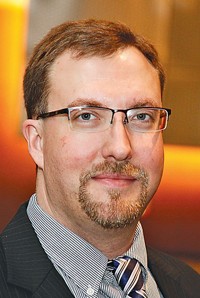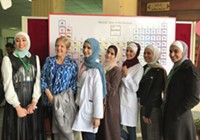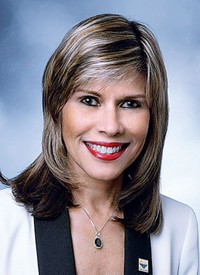Advertisement
Grab your lab coat. Let's get started
Welcome!
Welcome!
Create an account below to get 6 C&EN articles per month, receive newsletters and more - all free.
It seems this is your first time logging in online. Please enter the following information to continue.
As an ACS member you automatically get access to this site. All we need is few more details to create your reading experience.
Not you? Sign in with a different account.
Not you? Sign in with a different account.
ERROR 1
ERROR 1
ERROR 2
ERROR 2
ERROR 2
ERROR 2
ERROR 2
Password and Confirm password must match.
If you have an ACS member number, please enter it here so we can link this account to your membership. (optional)
ERROR 2
ACS values your privacy. By submitting your information, you are gaining access to C&EN and subscribing to our weekly newsletter. We use the information you provide to make your reading experience better, and we will never sell your data to third party members.
Careers
Ambassador For Chemistry, Science, And ACS
by Marinda Li Wu
November 26, 2012
| A version of this story appeared in
Volume 90, Issue 48

I am honored to serve as an ambassador not only for chemistry and science, but also for the American Chemical Society. St. Augustine said, “The world is a book, and those who do not travel read only a page.” I have visited chemistry communities both in the U.S. and abroad almost nonstop since my election to the ACS presidential succession, and I truly appreciate the friendships, knowledge, and fresh perspectives that result.
Serving the interests of members—who now number more than 164,000, including 25,000 abroad—has always been a top priority for me. The many wonderful e-mails and almost daily invitations I receive from them and others are humbling. Indeed, I have given more than 30 invited presentations this year for conferences, university chemistry departments, companies, research centers, international ACS chapters, and ACS local sections.
I travel widely to meet with chemists throughout the U.S. and the world so I can better understand how ACS can help its members advance. During these visits, I learn much and assure members that the society cares about them and their concerns, no matter how small their professional community or how far they live from the U.S. Embracing diversity and inclusivity is critical in our increasingly global chemistry enterprise. Listening to new perspectives and ideas can enrich discussions and help us be more innovative as we turn challenges into opportunities.
One of many local sections I visited this year was the Nebraska Section, founded in 1895 as the seventh ACS local section. The University of Nebraska chemistry department in 1887 hired the first female chemistry professor in the U.S.—Rachel Holloway Lloyd, who had to earn her Ph.D. abroad; it also employed the first few women chemists to join ACS. It was also wonderful to visit my alma maters, Ohio State University and the University of Illinois, Urbana-Champaign, in addition to many other great universities, including Rice University during its centennial celebration. Visits to Chemical Abstracts Service, ExxonMobil, Dow Chemical, government labs, and many other fine institutions proved quite informative.
ACS should form partnerships where it makes sense. I believe in building bridges with various organizations and in strengthening ties among different scientific disciplines; among industry, academia, and government; and among sister chemical societies in regions including Asia, Europe, and Latin America, with more to come in 2013.
It was fascinating to visit the Polish Chemical Society (PTChem), located in the Warsaw house where Maria Skłodowska Curie was born. She remains a role model for all women scientists. Imagine how touched I was to be awarded the Maria Skłodowska Curie Medal by PTChem and designated an honorary member!
As an invited plenary speaker at the Romanian Chemical Society (RCS) conference, I gave a presentation on “How Can We All Become Better Chemistry Ambassadors?” which I often present to U.S. audiences. I was thrilled to be made an honorary RCS member and awarded the Petru Poni medal for my work as a global chemistry ambassador. I held fruitful discussions with ACS members in Romania about potentially establishing an ACS chapter there.
In Hungary, I attended the Hungarian Chemical Society autumn conference and visited with the Hungarian ACS chapter. During the General Assembly of the European Association for Chemical & Molecular Sciences in Dublin, I shared a presentation on “How Do We Best Serve Our Member Societies?” with presidents of European chemical societies.
At the Latin American Federation of Chemical Associations congress, hosted by the Mexican Chemical Society, I presented a plenary lecture and attended an ACS-organized Festival de Química (Chemistry Festival). It brought together Mexican secondary school students, teachers, and families to participate in fun chemistry demonstrations.
As ACS and the chemistry enterprise become even more global, we should strive to become better ambassadors by promoting science, technology, and education and by looking for new ways to collaborate and facilitate scientific exchange across borders (C&EN, Sept. 13, 2010, page 40, and Aug. 6, 2007, page 37). In service to our members, ACS and our global networks offer meaningful opportunities to explore and enhance members’ awareness and readiness to engage colleagues worldwide to advance the transforming power of chemistry.
My presidential task force, “Vision 2025: Helping ACS Members Thrive in the Global Chemistry Enterprise,” has been hard at work examining the challenges and opportunities that our members face wherever they practice chemistry. The task force is recommending actions to help ACS provide valuable additional member support during these challenging times.
I invite you to attend my presidential symposium, “Vision 2025: How To Succeed in the Global Chemistry Enterprise,” at the ACS national meeting in New Orleans next April. U.S. leaders of academia, government, industry, and small business, along with presidents of sister chemical societies around the world, will participate. Proceedings will be shared in an ACS Symposium Series book to benefit chemistry communities everywhere.
I welcome your suggestions and ideas at m.wu@acs.org.
Views expressed on this page are those of the author and not necessarily those of ACS.





Join the conversation
Contact the reporter
Submit a Letter to the Editor for publication
Engage with us on Twitter